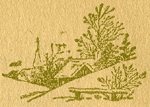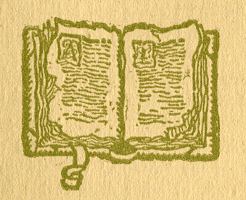| Home -> The Press in the Forest -> The Long Ago -> Chapter 8 | |||
 |
|||
|
|
|||
|
The Autumn Leaves
|
|||
| There were three recognized uses for leaves in the Autumn - first, to be banked by the wind along fences or sidewalk edges and provide kicking-ground for exuberant youngsters returning home from school; second, to be packed around the foundations of the house as a measure for interior comfort in winter; and, third, to be pressed between the pages of the big Bible and kept for ornamental purposes until they crumbled and had to be thrown away. This last-named use was always questioned by every red-blooded boy, and more tolerated than accepted - a concession to the women of earth, from little sister with her bright-hued wreath to mother and grandmother with their book of pressed leaves. Even for purposes of comfort their use was more or less secondary - granted because the banking-up process was a man's job and an out-door enterprise. Then, too, it was a lot of fun to rake the big yard and get the fallen leaves into one or two huge piles; and wheelbarrow them to the edge of the house where old Spencer had driven the wooden pegs that held the boards ready to receive the leaves. Load after load was dumped into the trough-like arrangement and stamped down tight and hard by old Tom's huge feet and little Willie's eager but ineffective ones - and then the top board was fastened down, and never a cold winter wind could find its way under the floors with such a protective bulwark around the house. . . . And in the spring the boards had to be taken down - and countless bleached bugs fairly oozed out into the spring sunlight - and the snow-wet soggy leaves were raked out and burned, and the smoke was so thick and heavy that it hardly got out of the yard. But the real use of leaves - their only legitimate function in the Autumn, according to all accepted boy-law - was for kicking purposes. Plunging through banks of dry leaves along the edge of the sidewalk-knee-deep sometimes - scattering them in all directions, even about our heads - there was such a racket that we could scarcely hear each other's shouts of glee. And we'd run through them only to dive exhausted into some huge pile of them, rolling and kicking and hollering until some kid came along and chucked an armful, dirt and all, plumb into our face! This was the signal for a battle of leaves - and perhaps there would have been fewer tardy-marks, teacher, if there had been fewer autumn leaves along the route . . . Perhaps! There were influences that tempered the joys of leaf-kicking - some "meanie" was always ready to hide a big rock, or other disagreeable foreign substance, under a particularly inviting bunch of leaves - then watch and giggle at your discomfiture when you came innocently ploughing along! What a riot of wonderful color they made just after the first frosts had turned their green to red and gold and brown! As a boy I disdained so weak a thing as noticing the coloring on Big Hill - but now, in the long-after years, I realize that its vivid Autumn garment was indestructibly fixed in my memory and has lived - saved for me until I could look back through Time's long glass and understand and love that glorious picture. Not even the brush of a Barbizon master could tell the story of Big Hill, three miles up the river from Main Street bridge, gleaming in the hues that Jack Frost mixed, beneath the blue-gold dome of a cloudless sky - for it could not paint the chatter of the squirrel, or the glint of the bursting bittersweet berry, or the call of the crow, or the crisp of the air, or the joy of life that only boyhood knows! |
|||
 |
|||